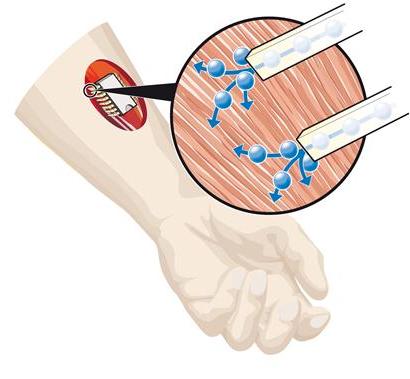Klas Tybrandt, a Linköping University student pursuing PhD in organic electronics, has devised an integrated chemical chip. The study findings have been reported in the Nature Communications journal.
 The chemical chip can control the delivery of the neurotransmitter acetylcholine. This enables chemical control of muscles, which are activated when they come into contact with acetylcholine.
The chemical chip can control the delivery of the neurotransmitter acetylcholine. This enables chemical control of muscles, which are activated when they come into contact with acetylcholine.
Ion transistors capable of transporting biomolecules as well as both negative and positive ions were previously devised by the organic electronics research team led by Magnus Berggren, Professor of organic electronics at Linköping University. However, the new chemical chip is a complementary circuit integrating both transistor types just as in conventional silicon-based electronics.
In chemical circuits, charge carriers comprise chemical substances with different functions, thus providing new opportunities to fine tune and control the cells’ signal path in the human body.
Berggren informed that the new integrated chemical chip is capable of working with typical signaling elements such as acetylcholine, thus paving the way to transmit signals to muscle synapses, in which the signaling system may not function due to some reason.
For the past three years, Tybrandt and Berggren have been working on the development of ion transistors that are capable of controlling and transporting charged biomolecules and ions. Karolinska Institutet researchers used these ion transistors to manipulate the supply of acetylcholine in single cells. The study findings were reported in the PNAS journal.
Tybrandt together with Robert Forchheimer, Professor of information coding at Linköping University, has succeeded in designing chemical chips featuring logic gates such as NAND gates, which enable for the development of all logical functions. Tybrandt’s approach lays the foundation for a new class of circuit technology relied on molecules and ions in place of holes and electrons.